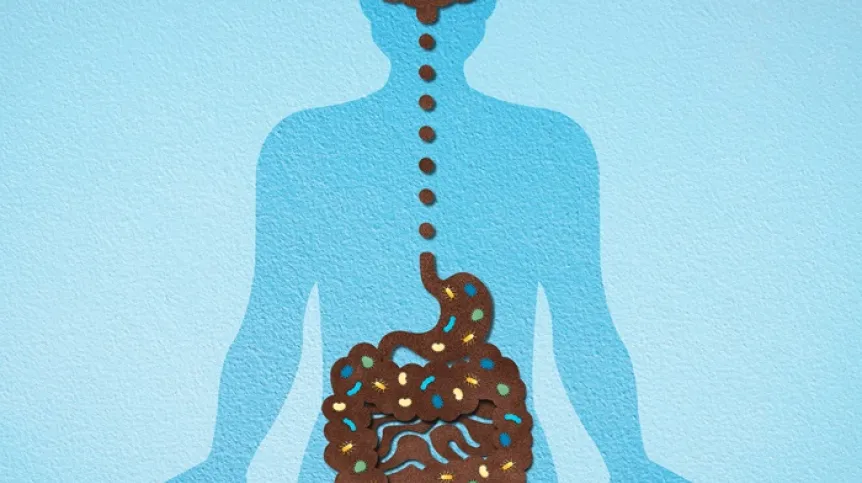
‘Diet can support or negatively impact the gut microbiota. In the latter case, we will quickly notice symptoms not only in the digestive system, but also mental well-being,’ says Dr. Joanna Jurek, a biomedicine and human immunonutrition expert.
MICROBIOTA AND FATIGUE
One of her latest papers (doi:10.3389/fimmu.2023.1253121) concerns the impact of diet therapy aimed at the intestinal microbiota in terms of alleviating the symptoms of chronic fatigue syndrome, chronic pain syndrome (fibromyalgia), and, in a broader sense, also symptoms related to the so-called long COVID.
'Covid-19 has left negative effects for many people, which, unfortunately, are felt even after the infection has been cured. For example, a significant group of people cannot return to their previous well-being even several months after the disease, and may experience symptoms such as a constant feeling of fatigue, mood disorders and even depressive symptoms.
‘And although there is not much talk about it yet and there is little research on it, we are beginning to notice that very often the mental symptoms characteristic of long COVID are accompanied by abnormalities in the composition of the intestinal microbiota, reminiscent of those in people suffering from irritable bowel syndrome,’ says Dr. Jurek, who currently works at the research centre of the Vall de Hebron clinical hospital in Barcelona (and previously - at the APC Microbiome Ireland research institute in Cork), where she deals with research on the impact of diet and probiotic therapy on broadly understood health and the risk of inflammatory diseases, also in terms of mental well-being.
Together with a team, she has shown that patients struggling with symptoms of chronic fatigue syndrome and chronic pain syndrome (firbiomyalgia) exhibit differences in the composition of their intestinal microbiota. This is an important finding because similar diagnostic criteria are currently used to diagnose fibromyalgia and chronic fatigue syndrome. 'We have shown that this is not necessarily the right thing to do, because the changes in intestinal function are different in these units. Therefore, it is worth looking at them separately and selecting probiotic supplementation for a specific disorder, which will better alleviate their symptoms,’ she says.
Another study in which the scientist participated (doi:10.3390/nu15214504) was a clinical study that concerned beta-glucan supplementation in patients with chronic fatigue syndrome. It has been shown that the use of this prebiotic improves various aspects of the functioning of the intestinal microbiota, thereby improving the quality of life of patients. 'We have shown that beta-glucan derived from yeast has the potential to alleviate some of the burdensome symptoms in these patients, although of course not all of them. Among other things, it significantly reduced the so-called cognitive fatigue,’ she says.
Dr. Jurek is preparing her third publication, based on a review of the scientific literature. It focuses on how probiotic therapy, based on various combinations of microbiological preparations along with other bioactive compounds with anti-inflammatory and antioxidant properties, can help alleviate fatigue, psychiatric symptoms related to anxiety and depression, and improve the functioning of the digestive system in people with chronic fatigue, also caused by long COVID.
'The scientific evidence I have collected is interesting and promising, although there is very little research on this issue in the world so far. But it is clear that the trend of combining probiotics with bioactive compounds of natural origin is correct. This concerns mainly plant extracts (e.g. pomegranate), turmeric, vitamins B and D, selenium, zinc, magnesium. From what I have determined based on the available literature, what this procedure gives is really effective, however, in order to be sure of its safety and effectiveness, we need more research,’ Jurek says.
MICROBOTA AND INFLAMMATION
The expert explains that all the issues she investigates have a common mechanism: diet-related inflammation that develops in the patient's body. It is present in fibromyalgia, chronic fatigue syndrome, and long COVID. 'That is why the combination of probiotics with the anti-inflammatory compounds I mentioned earlier has so much potential,’ she says.
She explains that chronic fatigue is accompanied by certain metabolic disorders that negatively affect the intestinal microbiota and promote the development of oxidative stress. This stress negatively affects the functioning of mitochondria and the process of cellular respiration. Mitochondria are not fully efficient, which further fuels oxidative stress and subsequently leads to the development of inflammation. And this is responsible for many adverse symptoms, including those related to chronic long COVID fatigue.
'All this fits together even more because the pandemic has +messed up+ our eating habits a bit. Some people have gained a lot of weight, others have developed eating disorders, which, of course, also affects the intestinal microbiota. And if it affects the microbiota, it is most likely also affects the psyche. Hence the mood disorders, depressive symptoms, anxiety symptoms and chronic fatigue. This is an extremely interesting issue; a fledgling, but very promising field,’ says Jurek, who is co-creator of several projects that prove that intestinal health and mental health are closely linked.
She suggests that in the future it is worth expanding this type of research to include people suffering from long COVID brain fog, various types of burnout, athletes, young learners, etc.
MICROBIOTA AND LIFESTYLE
Education of the public is important in the context of treatment of long COVID chronic fatigue syndrome. Without it, it is difficult to change anything permanently, the scientist emphasises. 'We can only deal with these types of problems through lifestyle. Unfortunately, this slogan is pure truth in this case. There is no simpler method or magic pill. To get rid of the symptoms, you need to act holistically; take care of sleep, diet and appropriate supplementation It requires effort and awareness from people,’ she continues.
Sleep deficit is not the only factor in our fatigue and poor well-being; it is closely followed by diet. 'And everything is interconnected again, because when we don't get enough sleep, our diet immediately deteriorates. The body automatically reaches for simple sugars to provide energy. You don't have to have an eating disorder to behave like this, because it is a natural physiological reaction The problem arises when we often do not get enough sleep, because then behaviours such as reaching for sweets become a habit. And a long-term eating pattern leads to disturbances in the intestinal microbiota and the circle closes,’ Dr. Jurek says.
She adds: ’Depression and fatigue disorders are very often associated with disorders in the intestinal microbiota. And it may be that our bad eating habits, e.g. as a result of an eating disorder, destroy the microbiota. But it may also be the other way round: if as a result of some other diseases, there have been changes in the microbiota, we may be more predisposed to mental disorders, including eating disorders.
'Remember that supplementation and a healthy diet are important not when our health is failing, but much earlier. For example, vitamins C and D in large doses will not help when we start to get sick. Taking care of their proper levels on a daily basis, throughout life, will help,’ she says.

Two books by Dr. Jurek are to be published later this year: one devoted to diet therapy in the treatment of chronic fatigue syndrome and one concerning the problem of emotional eating.
PAP - Science in Poland, Katarzyna Czechowicz
kap/ zan/ kap/
tr. RL













